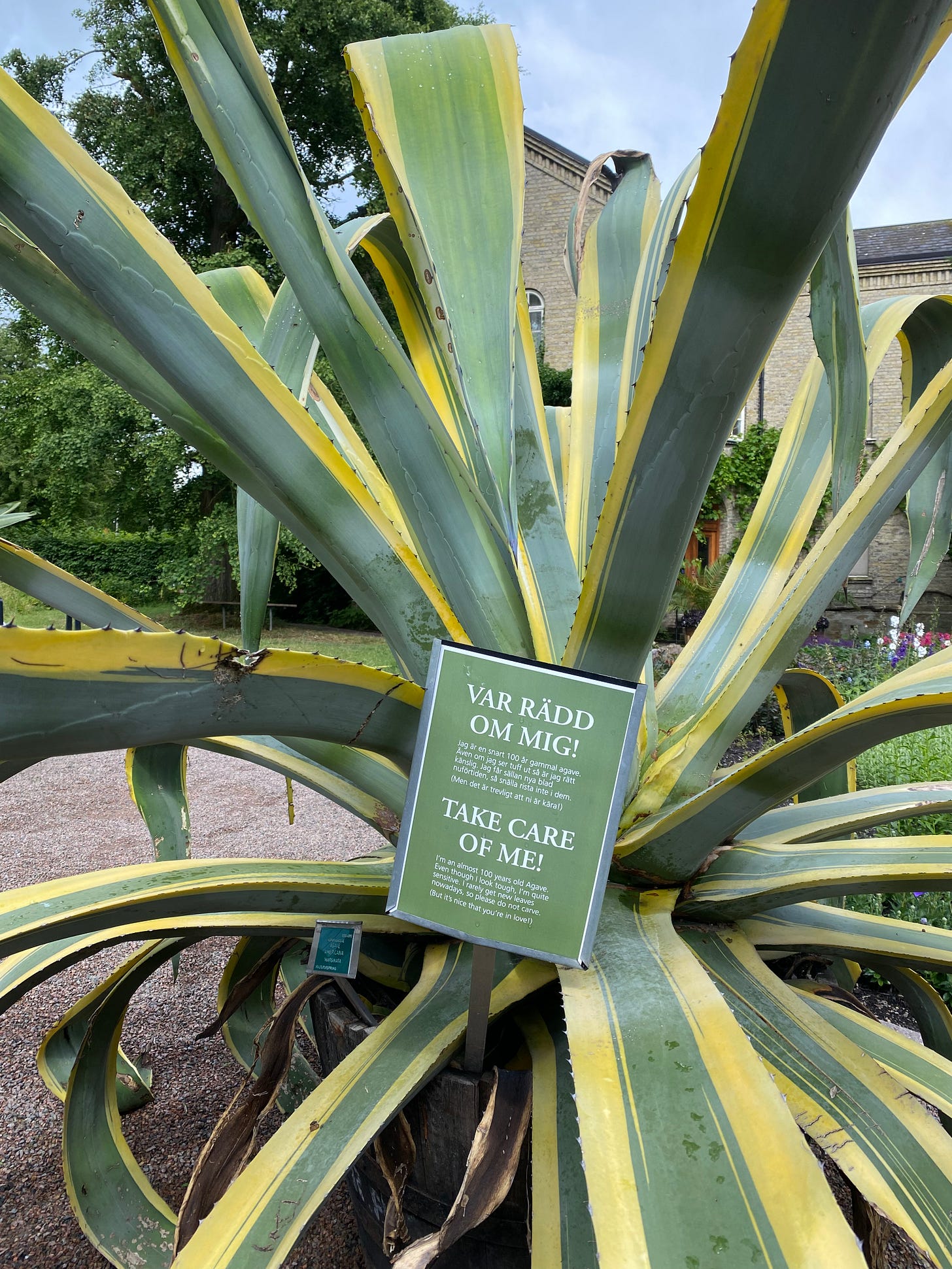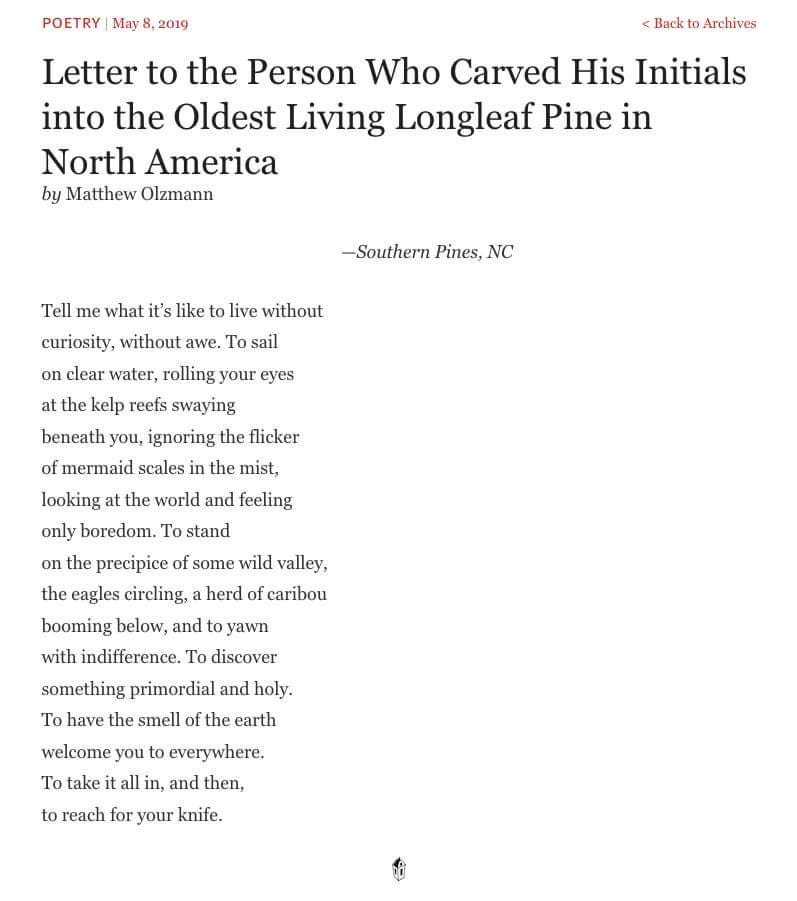poems, articles, & my favorite commencement speech of all time
this substack post will rewire your brain chemistry
Hi friends!
I have an incredible curation for y’all today, if I may say so myself. But first, I was recently in Sweden and came across this stunning 100-year-old agave plant. Its long, thick leaves marred by initials, hearts, stars, and words carved into it broke my heart. The sight reminded me of a poem I'd like to share with you…
Now, let’s get started. 📝
Generative AI Can’t Cite Its Sources (no paywall link here!)
Here’s a new twist on the clash between Silicon Valley and traditional media: tech companies are now integrating AI language models into every corner of the web, posing a real threat to journalism as we know it. Why head to your favorite news site when ChatGPT can give you the information you think you need? (/s, duh)
A growing number of media giants like The Wall Street Journal, Business Insider, and The Atlantic are signing deals with OpenAI to let their AI models use recent articles. This means AI tools can incorporate the latest journalism into their responses. But these deals raise big questions. Are these AI systems going to be good partners to media companies, driving readers to original sources? Or will they mess up citations and lead users to secondary sources, effectively shortchanging the outlets that produce quality journalism?
What makes this situation so fascinating is how it exposes the tensions between AI’s capabilities and its limitations. A standout quote from the article is, “We need web publishers to keep creating great journalism that is loaded up with facts because you can’t answer questions well if you don’t have accurate source material.” It shows the dependency AI has on reliable journalism while also highlighting the irony that these AI systems could undermine the very industry they rely on.
The implications are huge. If AI models can’t accurately cite sources or drive traffic to original articles, they might weaken the financial viability of media companies even further. This struggle for accurate attribution isn’t just about fairness; it’s about the survival of quality journalism in an AI-driven world.
Who Wants To Sit At A Communal Table? (no paywall link here!)
After years of isolation and plexiglass dividers, there's an ironic twist in our craving for connection and intimacy at the dinner table — now shared with strangers. Restaurants, grappling with soaring costs and tight margins, find communal tables not only economically beneficial but also a way to bring people together.
How will this reshape our dining experiences? Will it deepen our sense of community or make us long for the privacy we've grown accustomed to?
We’re in a New Era of Survey Science
Nobody answers unknown numbers anymore, so public polling has gotten far less accurate. Instead of the traditional phone surveys from decades ago, media companies, campaigns, and other pollsters now commonly commission opt-in online polls, which are plagued by liars, speedrunners, careless gig workers, and miscellaneous trolls. And those flawed surveys can mislead public opinion and erode trust in data that shapes crucial decisions. It makes me rethink how much weight we should give to survey results that dominate headlines and influence our views on major issues.
I wonder… how can we improve the reliability of survey data in an era where traditional methods are failing and new methods are fraught with inaccuracies?
How The World’s Largest Library Decides What Becomes History (no paywall link here!)
The scope of what the U.S. Library of Congress preserves is spectacular. I want to visit so badly. “[They] have every format people have ever used to record their knowledge and creativity,” which speaks to the library's mission to encapsulate the vast diversity of human expression. I wonder if they’ll have a Tiktok playing on a screen in there in 20 years.
Why Parents Don’t Mind If Their Kids Don’t Marry (no paywall link here!)
Few stereotypes are as familiar as the overbearing mom nagging her grown kids to get married and have babies. But it might be time to retire that cliché. According to a recent Pew Research Center survey, only 39 percent of U.S. voters believe society is better off when people prioritize marriage and children. Instead, a majority now think we’re just as well off if people focus on other priorities.
It’s fascinating to see how much attitudes have shifted. Back in the day, marriage and kids were seen as essential for financial stability. Today, they’re more about personal choice.
Stephanie Coontz, a historian and author, explains that historically, marriage was a financial necessity, a way to secure wealth and social status. Now, with financial independence achievable through careers, marriage and kids are more about personal fulfillment than economic security.
AI Has Become a Technology of Faith (no paywall link here!)
The focus of this one is on the recent launch of Thrive AI Health by Sam Altman and Arianna Huffington, which aims to integrate OpenAI's technology into personal health management. Despite the ambitious claims of transforming health outcomes and reducing costs, the actual implementation and practical utility of the promised "hyper-personalized AI health coach" remain unclear.
Is OpenAI — a company that’s had a slew of governance problems, leaks, and concerns about whether its leader is forthright — a company we want as part of our health-care infrastructure?
Keep reading with a 7-day free trial
Subscribe to learning-loving & meaning-making to keep reading this post and get 7 days of free access to the full post archives.






